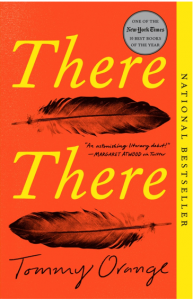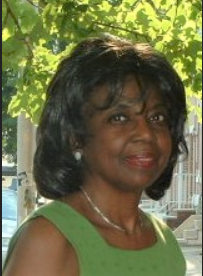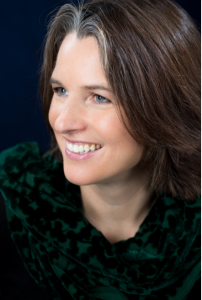
Erin Eileen Almond
— Former Philadelphia Stories Nonfiction Editor, Julia MacDonnell talks with Lanternfish Press author Erin Eileen Almond.
Erin Eileen Almond’s debut novel Witches’ Dance, just out from Philadelphia’s Lanternfish Press, is as riveting and intricate as the Paganini violin solo for which it is named. It’s one of those ‘curl up in a chair’ with tea or wine kind of books, the type the author herself, in a recent interview with Philadelphia Stories, said she loves to read. Thanks to its trio of main characters, Witches’ Dance is rich and edgy, and interwoven with enough suspense and sex to keep the pages turning.
Hilda Greer is an incandescent teen-age violin prodigy, as passionate as she is confused, torn between her love of classical music and her desire to become a rock star via the heavy metal band Devil’s Advocate.
Her beautiful, narcissistic mother Claire is a dance teacher whose career as a ballerina was cut short by early motherhood. Claire, who subsists on cigarettes, merlot, and a string of lovers, has raised Hilda alone after her jazz guitarist husband departed for the West Coast with one of his own young students.
Finally, there is Philip Manns, a virtuoso whose career as an internationally acclaimed violinist was ended by madness, in particular by an episode during which he believed that he’d become Paganini himself, the 19th century Italian virtuoso. Eventually Manns, reduced to teaching at the fictional Cambridge Conservatory, becomes Hilda’s teacher and mentor, with the alluring and troubled Claire forever hovering nearby.
In lustrous prose, and alternating among the points of view of Hilda, Claire, and Philip, Witches’ Dance ponders artistry and madness, and the tenacious if evanescent connections between creativity and insanity. Its publication is the culmination of 10 years of hard work for Almond, a decade during which she not only rewrote the novel ‘from scratch at least three times,’ but also gave birth to her three children, the youngest now in first grade. Not surprisingly, she put the novel down for ‘long stretches of time.’
“A more reasonable person might have just moved on to a different project at that point,” she says, “but I couldn’t seem to shake these characters and this story. I needed to write this book.”
Witches’ Dance reflects Almond’s own intense artistic journey, and her transformation from musician to writer. She began playing violin in elementary school, switched as a teenager to heavy metal guitar, but, ever ‘obsessed with virtuosity’, returned to violin, eventually matriculating in violin at the Hartford Conservatory, planning a career as a performer and teacher.
“That experience was very eye-opening for me,” she said, “and essentially confirmed what I’d long suspected – that I just didn’t have the talent, or maybe even the confidence, to really go for it as a professional musician.” Hence, her creation of the unforgettable Hilda, whose labile emotions find their truest expression in the music she plays.
“The story really began with Hilda, my teenage prodigy…” who, Almond speculates, represents “my own grief at realizing that I would never be a professional violinist.”
Christine Neulieb, editorial director at Lanternfish Press said, “I was captivated by the character Hilda: the conflict between her fierce desire to be a rock star and her prodigious talent at classical violin; her strained relationship with her immature mother; the bewildering vortex of inspiration and insanity she encounters in her violin teacher. In the midst of all this she has to sort out where to pin her self-worth as she finally comes into her own. I was rooting for Hilda from page one.”
Almond recently answered some questions about her writing life, about her marriage to another writer, and about publication by a small independent house, Philadelphia’s Lanternfish Press.
JM: If Witches’ Dance is an indication, your knowledge and love of music is a major force in your life. When or how did you realize that writing, not music, would be the focus of your creative life?
EA: Music has definitely been a big part of my life for a long time! I started playing the violin in elementary school … and I studied it pretty seriously until I got to high school and gave it up for heavy metal guitar. (My parents were duly horrified.) But, even as a terrible lead guitarist for bands with names like The Virgin Saints, I was obsessed with virtuosity. And eventually that obsession led me back to the violin, because violinists – especially Paganini who was obviously a big inspiration for Witches’ Dance – were the original rock stars.
After I dropped out of the conservatory, I enrolled in classes at my local community college. And that experience was eye-opening for me in a different way, because although I’d always known that I wanted to write a novel, no one had told me that you could go to college to study fiction writing.
JM: When or how did you know that novel writing would be the best expression of your creativity – assuming, from the quality of Witches’ Dance, that it is?
EA: Well, unless you count the terrible poetry that I was filling up notebooks with for most of my teen years, the novel was the first literary form that I ever tried to write. (I wish I could find and thank Donna Garden, my high school English teacher, who so sweetly read the chapters of my first novel attempt, ripped out of a spiral bound notebook, and encouraged me to keep going!) I adore short stories and poems and memoirs and essays, but I’m at my happiest as a reader when I’m engrossed in a long, complicated, and well-written novel. So, I always knew that, if I were trying to write the kind of book that I would most want to read, it would be a novel.
JM: When you first set out to write a novel, what did you think becoming a novelist would be like? What do you think about it now that you have been published? Does the reality match the fantasy?
EA: Back in my earliest days of fantasizing about being a published novelist, I had a very old-fashioned sense of what it would mean to be putting books in the world. I assumed that it was the perfect profession for an introvert because I could just write the books and not worry about having to go out in the world and promote them. That would be someone else’s job. (You can stop laughing now.) But I realized that wasn’t the case long before I published Witches’ Dance. Even though I’m still more comfortable alone in a room with my characters, than I am with public speaking, I’ve grown to love that part of it, too.
JM: How did you find the experience of submitting it to agents and publishers? What can you tell us about Lanternfish Press?
EA: I was lucky in that I connected with my agent, Danielle Bukowski, of Sterling Lord Literistic pretty quickly. I found her online and submitted to her because she listed Jonathan Strange & Mr. Norrell by Susanna Clarke as one of her favorite novels and it’s also one of my very favorites. Danielle really understood what I was up to in Witches’ Dance and was able to suggest some very smart revisions before she submitted it to editors at major publishing houses. But, even though it found a couple of editors who really loved it, those editors weren’t able to sell it to the marketing teams at their big houses.
At that point, since I had already started my second novel, Danielle and I talked about whether I was going to put Witches’ Dance on hold and maybe try to sell it as a second novel or submit to smaller independent publishers. And I’m so glad that I decided to search for an indie press because Lanternfish Press has been such a great home for Witches’ Dance. They’re interested in literary works that also includes elements of speculative or sci-fi fiction, and they’re not interested in playing it safe or mimicking the trends of the big presses. I’ve been super impressed with all of the books they put out and am so grateful that Witches’ Dance is in such good company.
JM: Can you tell us a little about your writing process – like, when do you write? All on computer or some handwriting? Do you share your drafts with other writers? Who first gets to read your work in progress?
EA: Well, I can give you my ideal process and then I can tell you what it’s really like on the ground… ideally, I would write every day, first thing in the morning, before my mind gets distracted by all the mundane logistical tasks that I have to deal with as a parent and homeowner. But, of course, before I can even sit down at my desk, there are three kids to get off to school and there are definitely days when, despite my best intentions, a kid stays home sick, or there’s a doctor’s appointment, or the car breaks down… But that’s the struggle for everyone, I think, even writers who aren’t parents have to figure out how to fit in their creative work in between the work that pays the bills and taking care of their loved ones. My guiding principal is to get to my fiction writing as early in the day as I can because by the time the kids go to bed at night I need to fill the well, and I’m only good for reading, not writing.
I do a lot of handwriting in journals when I’m developing an idea – that feels more conducive to the kind of loose, dreamy thought that works for me at that point in the process – but then I’ll move to my laptop when I’m ready to start composing scenes. I definitely outline before I begin, although that outline constantly morphs when I’m working on a first draft.
After Witches’ Dance, I swore that I wouldn’t show a novel draft to anyone until I had a first draft done, but then I almost immediately went back on that promise to myself early on in the process for my next novel. It’s just so hard to know that you’re on the right track once you get deep into a new project, and I’m really lucky to have a handful of writer friends whose opinions I trust and respect. Sometimes all you need is a little encouragement – yes, this is a viable project – and sometimes it helps to have someone point out an obvious flaw, early on, before you’ve spent four hundred pages writing yourself into a corner.
JM: Your husband Steve Almond, the original Dear Sugar, is a well-known writer of fiction and journalism. What’s it like to live with another writer?
EA: Ha – how much time do you have? It’s amazing to be married to another writer because no one understands the struggle like someone else who’s in it, too. But it’s also difficult because we’ve often had to negotiate – this was especially the case when our older kids were babies – who gets to write and who has to be the support person holding down the fort with the house and the kids. And because Steve was (and still is) the more established writer, as well as the writer whose work actually pays our bills, I’ve often felt guilty about prioritizing my own, mostly unpaid, work. That’s changed a bit in the past couple of years – putting out my first novel, definitely helps, but I’ve also started taking on manuscript consulting and publishing non-fiction pieces, and so now I’m learning how to balance creative work with what Steve calls “money-work,” too.
We’ve also had to learn how to be good readers for each other – we’re constantly sharing and discussing our work – and that was harder for me in the early days because I had a much thinner skin. I’ve learned that, for me, it’s better to show Steve work when I’m pretty sure that it’s done, whereas he’s more comfortable letting me see his prose much earlier. But the overall dynamic between us is extremely supportive – we’re definitely each other’s biggest fans. And I know that when I’ve written something that Steve really likes that it’s got to be good, because he’s a tough critic, and he’s always given me his honest opinion.
JM: How do you manage all those amazing characters in your imagination with all those actual characters – a husband and three kids!! – in your home? Any tips on how to shut off the creative flow and transition from writing fiction into being a mom?
Well, I would say that, for me, the difficulty is the other way around – it’s much harder to shut off the mom-brain and focus on my characters and my creative work! I mean, the kids’ needs (and sometimes the husband’s – ha!) are so immediate and tangible, whereas the characters, well, let’s just say that no one’s going to starve if I don’t make it to my writing desk on any given day. That’s another reason why I really try to prioritize doing my creative work as early in the day as possible, because once I’m ticking through items on my to-do list, it’s really hard to shut that off and connect to those dear people who exist only in my imagination.
But there are practical reasons to prioritize creative work, too – because I’m much more pleasant to be around when I’m working on my fiction. That is a real, tangible need, for me, at least, to feel creatively alive and effective in that way. And when I feel that I’m neglecting that part of myself I can become irritable and short-tempered and just, in general, unpleasant to be around. So, in a way, making sure I have time to do the creative work that feeds my soul also makes me a better parent and partner.
JM: What do you hope readers will take away from reading Witches’ Dance?
EA: I hope that readers will come away from the book curious about classical music – if they don’t love that music already! – and also of course, the violin, which is one of the reasons why I included a list of recommended recordings at the end for all of the major pieces mentioned in the book. I also hope readers appreciate the complexity of what all my main characters are up against: Hilda, in her quest to establish her own artistic identity, Phillip, in his struggle with the double burden of virtuosity and madness, and Claire with her maternal ambivalence and broken dreams.
JM: What do you love (are most proud of; most satisfied with) about your debut novel Witches’ Dance?
EA: The best part of the whole experience of putting Witches’ Dance into the world has been to connect with readers. There were many moments when I doubted it would ever see the light of day as a published book. Not because I didn’t think it was worthy of being published, but because I have enough writer friends to know how subjective the gatekeepers often are, and how difficult the publishing process can be. It’s very, very satisfying now to hear from readers who’ve enjoyed Witches’ Dance and who connect to the characters and their struggles.
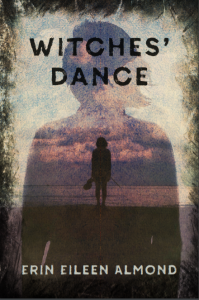
Excerpt From Witches’ Dance by Erin Eileen Almond
Paganini. What do you think when you hear that name? If you know classical music, if you’re lucky enough to be a fan of the violin, you might think of the Italian virtuoso Niccolò Paganini (1782–1840), widely recognized as the father of modern violin technique. You might know that Paganini was the first instrumentalist to tour widely as a solo act. You might have heard the legends about how he sold his soul to the devil. Or how, mischievously fueling those rumors, Paganini arrived for his concerts in funeral carriages, dressed all in black. None other than Goethe saw Paganini perform in Hamburg in 1828 and swore he saw a little man standing in the shadows to the left of the violinist, directing his fingers and bow. But because you belong to the modern age, an age in which devils have become passé, or at least predictable, it’s possible you prefer a scientific explanation for Paganini’s ability to play three octaves across four strings in a single hand span. Well. There’s always Marfan Syndrome, a genetic disorder that often afflicts its sufferers with long fingers and extreme flexibility.
But say you are none of these things. Not a twenty-first-century reader, not a casual admirer of the violin. Say, instead, that you are Phillip Manns, a twenty-three-year-old savant about to solo with the Boston Symphony Orchestra. Say you are at the end of a long tour, run-down, ready to return to New York with your manager, Anna Zedzevsky, for a well-earned rest. Say you hate the guest conductor, Georg Domini, an arrogant prig who interprets according to whim and who wears entirely too much product in his hair. Say that tonight’s program is Paganini’s Concerto no. 1 in D Major, and you are considered the world’s greatest interpreter of Paganini.
In that case, the year must be 1984. And although your given name is Phillip Manns, you must believe, despite how crazy it sounds, that you are Niccolò Paganini, or at least his reincarnation. It is your greatest pride, and your greatest secret—you’ve told only your manager, and she’s warned you not to tell another soul.

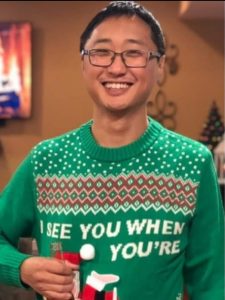
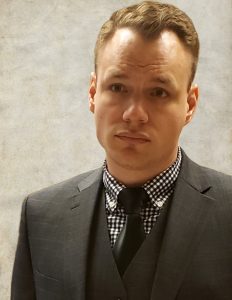

 Courtney Bambrick
Courtney Bambrick


